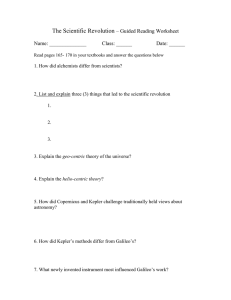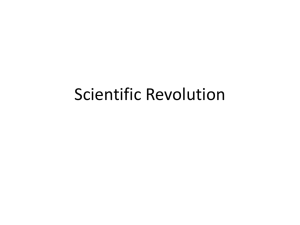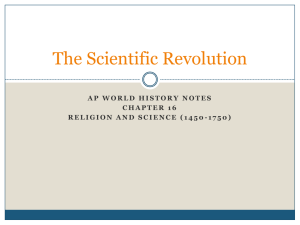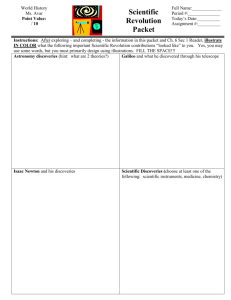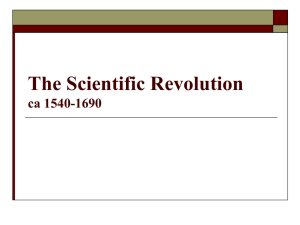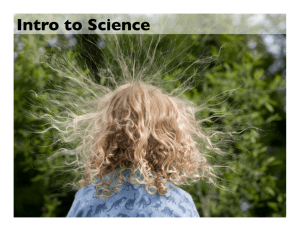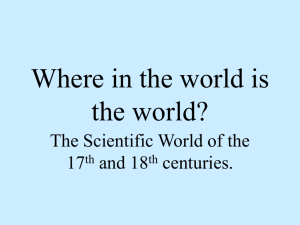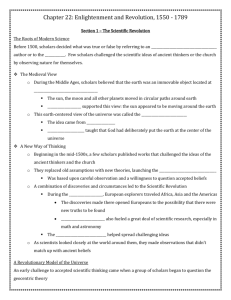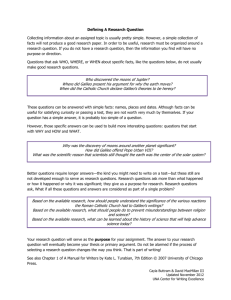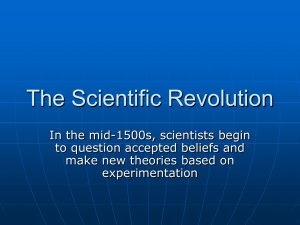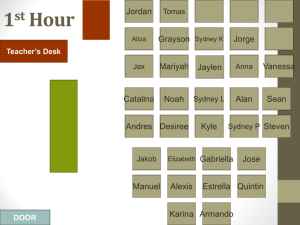TheScientificRevolution
advertisement
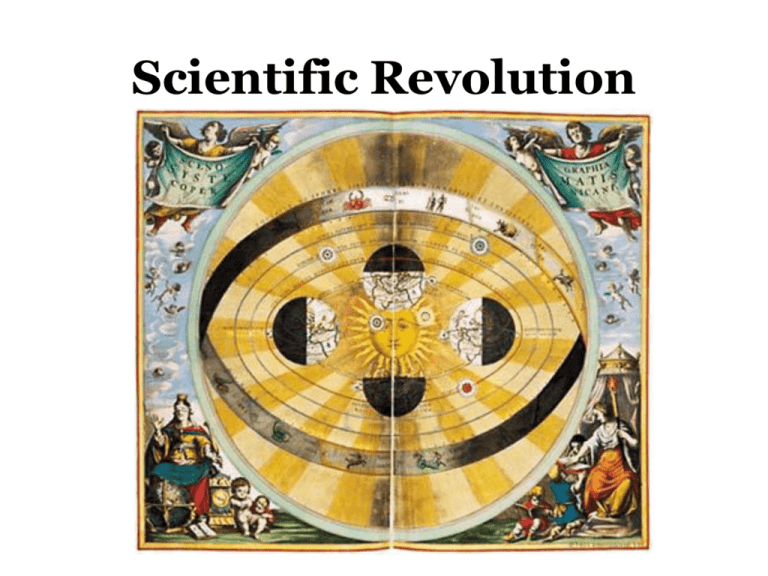
Scientific Revolution Scientific Revolution • Scholars during the 1500s, began to question classical scientific ideas and Christian beliefs. This became known as the Scientific Revolution. – Revolution = Major Change • During this time period, people in Europe began to change the way they thought about the world. – Old way of Scientific thinking was based on the Bible and Aristotle • Aristotle thought the earth was the center of the Universe. • Nobody questioned him for 2,000 years!! - New way of Thinking used reason and logic (not just faith) to explain the world. Scientific Method • During the scientific revolution, a step by step process that required scientists to collect and accurately measure data evolved called the Scientific Method. • Steps of the Scientific Method: 1. 2. 3. 4. 5. 6. 7. State the Problem Gather information about the problem Form a hypothesis – an educated guess Experiment to test the hypothesis Collect, record, and analyze data. Draw Conclusions Share your conclusions and answer questions. 4 SCIENTISTS MADE DISCOVERIES THAT CHANGED THE WORLD Copernicus • Main Theory: – Wrote the Revolutions of the Heavenly Spheres in 1543. • The universe is heliocentric and revolves around the sun and not the Earth. • Most people STILL did not believe him!! • Tycho Brahe = a Danish astronomer provided evidence that supported Copernicus’s theories. Johannes Kepler • Main Theory: – Planets move in orbits that are elliptical (oval) not round. Galileo • Main Theory: – Galileo built the first telescope and studied the planets and moon. • Telescope = magnifies distant objects and is used to study the skies (astronomy) – Galileo’s Theories caused an uproar with the church! Galileo’s Trial • The church condemned Galileo because his ideas challenged the Christian teaching that the heavens were fixed in position to the Earth. • In 1633, Galileo was tried before the Inquisition. – Sentenced to house arrest and silence – Threatened with death unless he said his theories were wrong (even though they were not!) Isaac Newton • Main Theory: – Discovered the force of gravity. • Used math to prove that gravity keeps the planets in their orbit moving around the sun. – The greatest scientist who ever lived Other Important People… • Vesalius – human anatomy • William Harvey – circulation of blood • Leeuwenhoek – microscope to see human cells and microorganisms. • Robert Boyle - chemistry Consequences of Scientific Revolution • Community of scientists formed – Royal Society – Papers were read and published • Scientists subjected to critical audience • Science accepted as the preferred method of getting "truth" Flash Cards • • • • Make 10 Flashcards for homework! They can be vocab terms, events, or people, Pick 10 that you struggle with the most!!! If you don’t have index cards, cut up sheets of paper! • You will be quizzing a partner tomorrow! Laundry day Survey • On a half sheet of paper – write the answers to the following questions FROM THIS UNIT (The RENAISSANCE): 1. What do you feel like you need to review? (people, vocab, events?) 2. What would you like more information about? 3. On a scale of 1 to 5 how well to you feel you understand this unit (1 being NOT well and 5 being very well) Utopia • Read Thomas More's Utopia out loud with your group. • Illustrate what his “utopia” looks like. • Present to the class. • Then answer the following Questions: • Do you agree with More’s Utopia? Explain why or Why not. • In 1 paragraph- What would your Utopia look like? Include geography, dinning, culture, government, marriage, life and death, etc.
